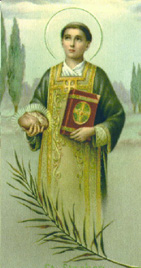We ask you, urgently: don’t scroll past this
Dear readers, Catholic Online was de-platformed by Shopify for our pro-life beliefs. They shut down our Catholic Online, Catholic Online School, Prayer Candles, and Catholic Online Learning Resources—essential faith tools serving over 1.4 million students and millions of families worldwide. Our founders, now in their 70's, just gave their entire life savings to protect this mission. But fewer than 2% of readers donate. If everyone gave just $5, the cost of a coffee, we could rebuild stronger and keep Catholic education free for all. Stand with us in faith. Thank you.Help Now >
It's Cinco de Mayo! Do we really know what that means?
FREE Catholic Classes
Many believe that this day is linked to Mexican independence, which it is not.
Highlights
Catholic Online (https://www.catholic.org)
5/5/2010 (1 decade ago)
Published in Americas
WASHINGTON, DC (Catholic Online) - Cinco de Mayo - "The fifth of May" in Spanish. When we hear those words it is usually related to a party involving Margaritas and exciting Mexican foods. But where did it begin?
Many believe that this day is linked to Mexican independence, which it is not.
During the time of America's Civil War, Mexico had problems of its own. The country had borrowed a great deal of money from three European nations: England, Spain and France. With debt continuing to accumulate, Mexican President Benito Juarez decided to suspend payments of interest to all three.
While negotiations with England and Spain were successful, France, under Napolean III, decided to invade and occupy Mexico to get their money back. His idea was to install Austrian Archduke Maximillian as the new leader of the country.
On May 5, 1862 the smaller Mexican army, with older, more inferior weapons and equipment, defeated the French at Puebla, southwest of Mexico City. The Battle of Puebla was the first battle the French had lost in 50 years, especially since they outnumbered the Mexicans 8,000 to 4,000 soldiers.
Unfortunately, the French reinforced their numbers and, in 1864, Maximillian took the the throne. Under pressure from the U.S., French forces began to withdraw in 1866 and, in 1867, Maximillian was deposed and executed.
Cinco de Mayo currently has only a regional importance in Mexico. In the United States and other countries, however, the day has come to be known as a celebration of Mexican heritage and pride.
Like St. Patrick's Day and Oktoberfest, one doesn't need to be of Mexican decent to enjoy the festivities. Schools have used this day to teach the history and heritage of Mexico. Events and celebrations incorporate foods, music, dancing and demonstrations.
So, Happy Cinco de Mayo!
---
'Help Give every Student and Teacher FREE resources for a world-class Moral Catholic Education'
Copyright 2021 - Distributed by Catholic Online
Join the Movement
When you sign up below, you don't just join an email list - you're joining an entire movement for Free world class Catholic education.

-

-
Mysteries of the Rosary
-
St. Faustina Kowalska
-
Litany of the Blessed Virgin Mary
-
Saint of the Day for Wednesday, Oct 4th, 2023
-
Popular Saints
-
St. Francis of Assisi
-
Bible
-
Female / Women Saints
-
7 Morning Prayers you need to get your day started with God
-
Litany of the Blessed Virgin Mary
Daily Catholic
 Daily Readings for Thursday, December 26, 2024
Daily Readings for Thursday, December 26, 2024 St. Stephen: Saint of the Day for Thursday, December 26, 2024
St. Stephen: Saint of the Day for Thursday, December 26, 2024 Rosary Prayers: Prayer of the Day for Thursday, December 26, 2024
Rosary Prayers: Prayer of the Day for Thursday, December 26, 2024- Daily Readings for Wednesday, December 25, 2024
- St. Eugenia: Saint of the Day for Wednesday, December 25, 2024
- Christmas Prayer: Prayer of the Day for Wednesday, December 25, 2024
![]()
Copyright 2024 Catholic Online. All materials contained on this site, whether written, audible or visual are the exclusive property of Catholic Online and are protected under U.S. and International copyright laws, © Copyright 2024 Catholic Online. Any unauthorized use, without prior written consent of Catholic Online is strictly forbidden and prohibited.
Catholic Online is a Project of Your Catholic Voice Foundation, a Not-for-Profit Corporation. Your Catholic Voice Foundation has been granted a recognition of tax exemption under Section 501(c)(3) of the Internal Revenue Code. Federal Tax Identification Number: 81-0596847. Your gift is tax-deductible as allowed by law.





 Daily Readings for Thursday, December 26, 2024
Daily Readings for Thursday, December 26, 2024 St. Stephen: Saint of the Day for Thursday, December 26, 2024
St. Stephen: Saint of the Day for Thursday, December 26, 2024 Rosary Prayers: Prayer of the Day for Thursday, December 26, 2024
Rosary Prayers: Prayer of the Day for Thursday, December 26, 2024

